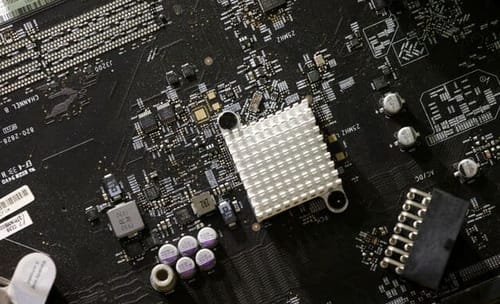 |
| Russia may target the US chip industry |
The White House has warned chip makers that if Russia retaliates against US threats to impose restrictions on exports by blocking access to vital materials, they will need to diversify their supply chains.
The possibility of retaliation drew more attention in recent days after a report by market researcher Techcet highlighted the reliance of many chip makers on materials from Russia and Ukraine, such as neon, palladium and others.
Techcet estimates that more than 90% of the US supply of semiconductor-class neon comes from Ukraine. And 35% of palladium in the United States comes from Russia.
White House National Security Council member Peter Harrell and his team have spoken to members of the chip industry over the past few days. And try to find out how much Russian and Ukrainian chipmaking equipment these companies need. He also urged them to find alternative sources.
The White House declined to comment on the details of the talks. But a senior official confirmed that the government was prepared in case Russia invaded Ukraine.
"We are working with companies to ensure they are prepared for disruption if Russia takes measures to disrupt supply chains," the official said.
"There are other sources of important products and we are ready to work with our companies to help them define and diversify their offerings," he added.
Joe Pacetti, vice president of global public policy at SEMI, sent an email to members this week about the supply situation in the critical chip industry, according to a copy obtained by Reuters.
Books: Please see the attached documentation on some semiconductor materials made in Russia and Ukraine.
He cites Techcet's summary of C4F6 materials, palladium, helium, neon, and scandium from disturbed regions. "If your company has concerns about a possible supply disruption to any of these products, please let me know," he said.
Neon lights, a necessary part of lasers used in chip manufacturing, are a by-product of Russia's steel industry. It is cleaned in Ukraine. Palladium is used in applications such as sensors and memory.
White House warns of possible attacks on the US chip industry
The Biden administration threatened Russia with export restrictions if Russia invaded Ukraine. Russia denies planning an attack. Some chip manufacturers are scrutinizing supply chains for possible consequences of the conflict in Ukraine.
An executive at a startup designing energy chips said the unrest in Ukraine has driven up inert gas prices and could lead to supply problems.
The official added that fluorine, another gas that supplies the region with large amounts of gas, may be affected.
Intel spokesman William Moss said the chip maker does not expect any impact on neon supply.
However, the issue remains a concern, as the global chip supply is tight and chip orders are expected to increase.
Techcet estimates that demand for all materials could grow by more than 37% over the next four years. She referred to recent announcements by Intel, Samsung and Taiwan's TSMC in Ohio, Arizona and Texas.
Before Russia annexed Crimea to Ukraine in 2014, the price of neon lights rose by 600%. The chip companies rely on a few Ukrainian companies, according to the United States International Trade Commission.
